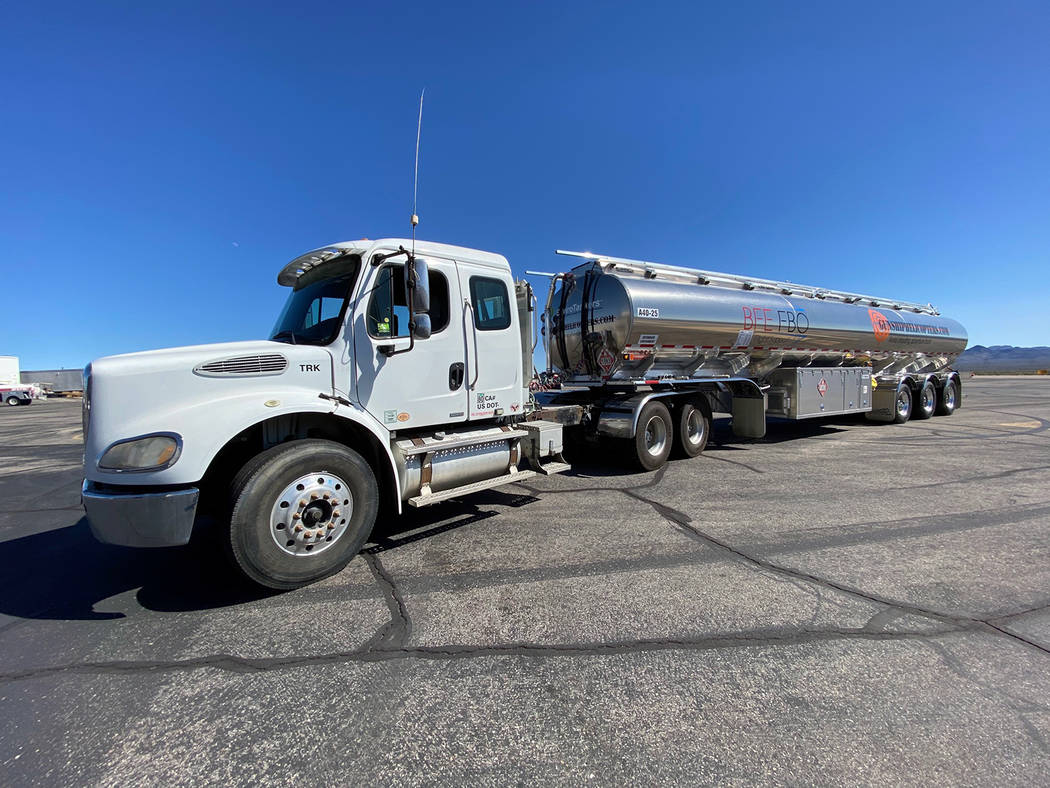Judge OKs fuel tankers use
An operator at the Boulder City Municipal Airport can now use his tractor-trailers to dispense fuel, thanks to an order from a District Court judge.
On March 5, Judge Timothy C. Williams granted a motion for a preliminary injunction allowing BFE LLC to dispense fuel from two 10,000-gallon mobile refueling trailers while the company’s complaint against the city is decided in District Court. He also described the city’s enforcement of fuel storage methods as “arbitrary and capricious.”
“As an aviator of over 40 years working to build the public’s trust with fuel sales, aircraft pilot/mechanic and all other FBO (fixed base operator) requests, it’s nice to read the judge’s findings under the facts of this case … and (that he) grants BFE’s motion for injunction,” said Robert Fahnestock, owner of BFE LLC.
Fahnestock filed a complaint against the city and the Boulder City Fire Department in November after he was told he could not use the mobile refueling trailers he had purchased to conduct fueling and refueling activities allowed under his lease. He was told they violated the 2012 International Fire Code, airport rules and minimum standards, and his lease, which allows only underground fuel storage tanks.
In his minute order filed March 5, Williams wrote that the fire code defines tank storage as “the storage of flammable and combustible liquids in portable tanks whose capacity exceeds 660 gallons.”
“Hypothetically, all mobile fuel tenders in use at the Boulder City Airport would violate the IFC (International Fire Code),” he wrote. “Additionally, all vehicles categorized as mobile fuel tenders, whether they have the capacity of 2,500 to 8,500 gallons or more, are used to perform refueling and storage functions.”
“It is always disappointing when a judge, who by his own admission is not familiar with airport operations, fueling or the fire code, assumes the role of the fire marshal in interpreting and enforcing the fire code,” said City Attorney Steve Morris. “Public safety is and always will be the top priority of the city and, for the sake of public safety, the city intends to take procedural steps to overturn the erroneous interpretation of the fire code by Judge Williams.”
At at March 4 hearing regarding Fahnestock’s complaint and request for the injunction, his attorney Cami M. Perkins said Fahnestock could not in good conscience buy and dispense fuel from the city’s “unsafe fuel farm.”
Fahnestock said he had received documents about the city’s fuel farm’s safety inspections and found discrepancies in them. He sent them to an independent party, Aviation Training Academy, to audit the results, which also found discrepancies and safety concerns with the city’s fuel farm, including “failing to comply with various aviation industry standards.”
During the hearing, Morris referred to the unsafe claims as a “red herring.”
“It’s not accurate,” he said. “It’s not true.”
He also said BFE LLC was attempting to circumvent the airport’s rules.
No other hearings are scheduled, but Williams asked Perkins to submit an amended complaint and Morris to submit the city’s response before a final decision is issued.
“BFE is a tenant of the city of Boulder City through a sublease of over $15,000 per month plus another $3,000 in flowage fees and now I have just spent thousands defending my right to compete with a landlord, the city of Boulder City,” Fahnestock said. “The city manager and city attorney, my landlord and his attorney, have no excuse for losing or entering into this litigation and they have no idea how to run an airport. It’s time for the City Council to act.”
BFE LLC has been a fixed base operator at the airport for 13 years and would purchase fuel at the city’s self-service pumps at the airport, which was resold to customers for a profit.
In August 2018, the city restructured the operation and sold fuel directly to aviators.
















